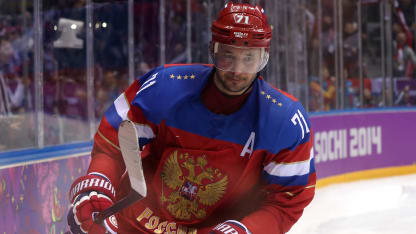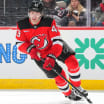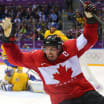RELATED: [Fantasy projection for Kovalchuk with Kings in 2018-19]
The reward for the Kings is that Kovalchuk, a point-per-game player in the NHL (816 points in 816 games) before leaving for Russia, could score up to 72 points next season and help boost them into Stanley Cup contention. However, the risk of signing a 35-year-old forward who hasn't played an NHL game since April 27, 2013, is that his skill won't translate back to the NHL, and that he could put up 40 points or fewer next season.
The most realistic outcome is around 56 points. A variety of approaches were used to arrive at these estimates, the first of which involves converting his KHL scoring totals to an NHL equivalent using translation factors. This approach highlights his best-case scenario.
Translation factors are percents that are based on how players have performed in the NHL in the past, in this case after coming from the KHL or its predecessor, the Russian Super League. They are calculated by taking a player's points-per-game average in the NHL in one season and dividing it by how that player performed in the other league in the preceding season. Based on the 54 players to do so since 2005-06 (minimum 20 games in each league), the average player retained 72.7 percent of his scoring when going to the NHL.
That translation factor is validated by Kovalchuk's own KHL-to-NHL experience. When the 2012-13 NHL season was delayed by a lockout, he had 42 points (18 goals, 24 assists) in 36 games in the KHL, then had 31 points (11 goals, 20 assists) in 37 NHL games after play resumed. That works out to 1.17 points per game in the KHL and 0.84 in the NHL, which is 73.8 percent.
If this trend holds, Kovalchuk could top 70 points next season. In 2017-18, he led the KHL with 63 points (31 goals, 32 assists) in 53 games, an average of 1.19 points per game. When multiplied by 73.8 percent, that works out to 0.88 points per game, which would be 72 points in 82 NHL games.


















